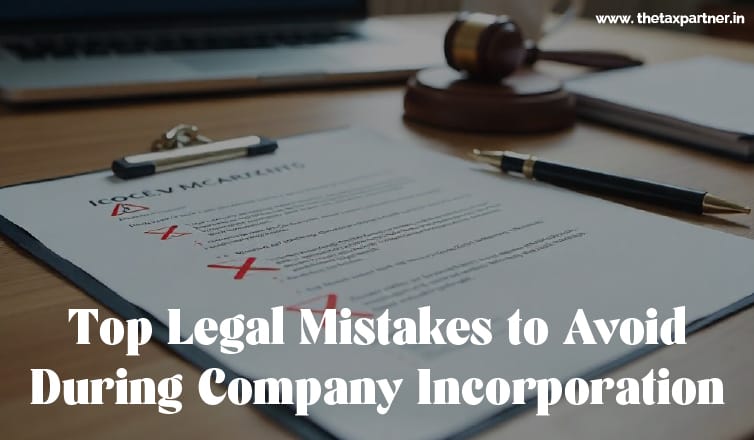Connect with us for all your queries



Real Lessons from the Field, Shared by Team TwoTax
Incorporating a business is one of the most exciting steps for any entrepreneur. It marks the transition from a concept to a recognized legal entity. However, beneath this milestone lies a complex layer of legal formalities and statutory responsibilities that, if ignored, can lead to significant consequences — ranging from fines to funding blocks.
At TwoTax, we’ve worked closely with founders across India and have observed firsthand how avoidable mistakes during incorporation have impacted even the most promising ventures. This article outlines the most common legal mistakes entrepreneurs make — backed by real-life inspired stories — and offers expert guidance on how to avoid them.
The legal structure of your company affects taxation, liability, fundraising, and compliance burden. Yet, many entrepreneurs select a structure without professional guidance.
Aarav, a freelance developer from Jaipur, opted for a Private Limited Company based on online articles. Months later, he was overwhelmed with the compliance load and audit requirements — something more appropriate for a larger business. Upon consultation, we helped him migrate to a Sole Proprietorship, which better suited his scale.
Every structure—Private Limited, LLP, OPC, or Sole Proprietorship—has its own merits. Selection should be based on business goals, liability preference, and compliance readiness.
The Memorandum of Association (MOA) and Articles of Association (AOA) serve as the legal backbone of your company. These documents define your company’s objectives, governance rules, and powers.
A startup from Gurugram lost a ₹2 crore investment opportunity because its MOA lacked provisions for fintech services. The investor refused until the document was amended—causing a delay of nearly two months.
MOA and AOA must be customized, reviewed by legal professionals, and aligned with your current and future business plans.
One of the biggest oversights in early-stage startups is the absence of a Founder's Agreement. Many startups begin with informal understandings between friends or colleagues, which can later spiral into disputes.
Two co-founders of an edtech platform, once best friends, found themselves in a legal battle when one exited, claiming 50% equity without any formal agreement. The absence of a founder's agreement resulted in a deadlock.
Every startup must sign a founder’s agreement clearly defining roles, responsibilities, equity, vesting, and exit terms.
Incorporation is only the beginning. Businesses often fail to complete essential post-incorporation tasks like PAN, TAN, GST, and ESI/PF registrations.
Riya, a boutique owner from Surat, neglected GST registration assuming her turnover was below the threshold. After an export order pushed her above the limit, she was fined for late registration and non-filing.
Stay on top of post-incorporation tax obligations from day one to avoid penalties.
Startups invest significant effort in branding but often delay trademark registration, leaving them vulnerable to IP theft.
A café owner in Bhopal built a strong local brand. But due to no trademark filing, a new restaurant in the same city copied their name and theme. With no trademark, legal options were limited.
Trademark registration must be initiated immediately after name finalization. It protects your brand and builds credibility with investors.
A separate business bank account is a statutory requirement for most entities, yet many founders continue using personal accounts.
A freelance photographer operating from a personal account faced complications during ITR filing and lost track of claimable expenses. He also missed out on business deductions.
Open a business bank account post-incorporation and ensure all transactions flow through it.
Online templates might seem cost-effective but are often outdated or irrelevant for specific industries.
Ramesh, a mechanical engineer, filed his company using free templates. He missed Form INC-20A, and the company was marked inactive within six months. His business credibility took a hit.
Seek expert assistance to ensure all filings are completed accurately and on time.
The Startup India scheme offers tax exemptions, easier compliance, and fast-track IP filing. However, many businesses ignore it.
A Pune-based SaaS startup delayed the application, missing out on key investor discussions that favored DPIIT-recognized entities.
Apply early to maximize benefits under Startup India.
Even dormant companies must file ROC annual returns. Failing to do so can lead to penalties and strike-off.
An inactive IT company missed its annual filings and was served a notice by the MCA. Reinstating the company involved heavy legal fees and time.
Stay compliant with MCA regulations regardless of business activity level.
Your incorporation is not just paperwork — it’s the legal foundation on which your business stands. Errors made at this stage can limit opportunities, invite penalties, and erode trust.
At TwoTax, we go beyond registration. We walk with you through the entire journey — from choosing the right structure to ensuring every legal corner is covered.
If you're planning to incorporate your business or feel unsure about your legal standing, connect with our experts today.
Tax Partner is India’s most reliable online business service platform, dedicated to helping you in starting, growing, & flourishing your business with our wide array of expert services at a very affordable cost.